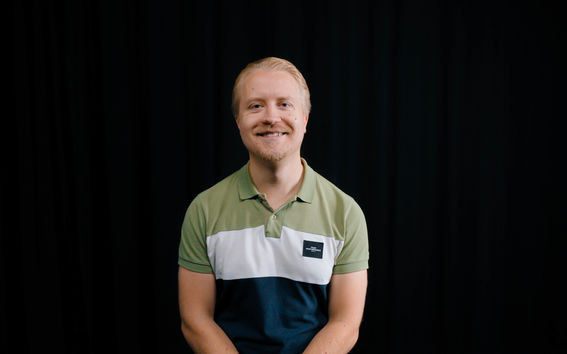Surgify: Drilling down into a surgical startup’s journey
We spoke with Visa Sippola, Surgify CEO and co-founder, about the medical startup's journey from concept to fruition, plus how Aalto University played an integral role in the company’s progress.

Over 310 million patients across the globe receive major surgery each year (source). Of those surgeries, it's believed that up to 15% incur complications, impacting a staggering 46 million people annually (source). That's over eight times the population of Finland.
Helsinki-based medical startup Surgify is playing its part in reducing post-surgical complications. Its groundbreaking surgical drill design is helping to reduce the risks associated with complex brain surgeries while improving recovery time.
We spoke with Surgify CEO and co-founder Visa Sippola about the startup's journey from concept to fruition, plus how Aalto University played an integral role in Surgify's progress.
Why did you set up Surgify?
While I was undertaking my PhD in Neuroscience at Helsinki University Hospital (HUS), I observed many brain surgeries where surgical drills are commonly used to cut through bone close to vital brain tissue.
The need for better equipment was obvious. Traditional drills are simply not sophisticated enough, and they can pose a big risk to patients - even in the hands of the most skilled surgeons.
When it comes to brain surgery, there's no margin for error. You could accidentally sever important brain tissue - and the complications can be really dangerous. So, I set about creating a design to make bone surgery safer for patients and easier for surgeons. My team and I have now created failsafe drill burrs that can attach to traditional surgical drills.
It distinguishes between tissue types, namely bone and soft tissue - cutting one while leaving the other intact.
How did you progress from your first concept?
I discussed my concept with a HUS professor, who encouraged me to contact Aalto University. A professor at Aalto then paired me with my first co-founder, Shahab Haeri, who was then a mechanical engineering master's student.
In the following months we joined up with a further two co-founders joined: Juho Carpén, who was an economics and accounting major, and Jukka Kreander, who specialised in systems and quality management.
We worked together on the design and build of several prototypes, going through numerous iterations to refine the concept. At every stage, we worked with brain surgeons to test the drill burrs’ capabilities in simulated surgical conditions. We used their detailed feedback to enhance the products.
What was that experience like for you?
It was an exciting time. We were quick to make changes and even quicker to test them out. We shared the philosophy that if we spent too much time designing a prototype without testing it, we couldn't be sure about the usability of the product.
We needed to be sure we were designing the products for the people who would use them - that's why regular testing with brain surgeons was such a critical step in the process.
Surgify is fixing a major problem in surgery. The design means that surgeons don't need to buy expensive equipment to use the product or go through extensive training. Instead, they can use existing drills as they usually would - but the Surgify attachment makes the process safer, faster, and more precise.
What role did Aalto University play in your journey?
Two out of Surgify's four co-founders studied at Aalto. But beyond that, being part of the Aalto startup community really helped us to get off the ground, It played a huge part in our commercialisation.
Being plugged into a network of entrepreneurial thinkers helped us make connections, securing us investment, finance, research and consultation support. Because we were part of the university network, we were also able to gain funding for Surgify from Business Finland, which supports academic institution-based startups with public financing.
I think it was really important to have founded Surgify within the Aalto space. Being part of a community that supports entrepreneurship is motivating - it pushes the boundaries of what's possible.
What's next for Surgify?
We’re still operating from the Aalto Startup Centre along with over 50 other startups. The product has been CE-marked and is in use at Finnish university hospitals. The feedback from surgeons has been exceptional - the product has been safe and effective in clinical use.
We now have our sights set on the Nordic medical markets, and we then have plans to make the products available in Europe and the US.
The applications for Surgify products are extensive. While the concept originates in neurosurgery, dentistry, orthopaedic and automated surgeries can all benefit from using our drill attachments.
What advice would you give to other would-be startup founders?
I recommend finding people with expertise in the skills you lack. It is important to always team up with people who know more than you. As an example, our founding team included members with clinical, technical, and business backgrounds, which is critical for medical device development.
I’m also a believer in the 'fail fast, learn fast' approach. If you're really proud of your first prototype, you've probably spent way too much time on it!
Aalto University's entrepreneurial community is helping startups like Surgify to thrive. Want to kick off your own entrepreneurial journey? Check out the Starting Up course. The open access online course covers the fundamentals of startup entrepreneurship. If you want to learn more about founding your startup with Aalto, explore the Aalto Startup Centre.
Show other posts from this blog

Fepod: a medical startup's innovation helps to optimise pain medication doses
We spoke with Elsi Verrinder about Fepod's innovation and her journey from Aalto PhD student to CSO of a medical startup.
VacuumWood.Tech: A wood structure start-up that’s going against the grain
Find out how VacuumWood.Tech is using ultra-sustainable wooden structures to fight climate change.
A free-flowing conversation with AI communication startup, Flowrite
We spend about 3.1 hours on work emails daily. We spoke with Flowrite, an AI communication startup that’s helping professionals save time.